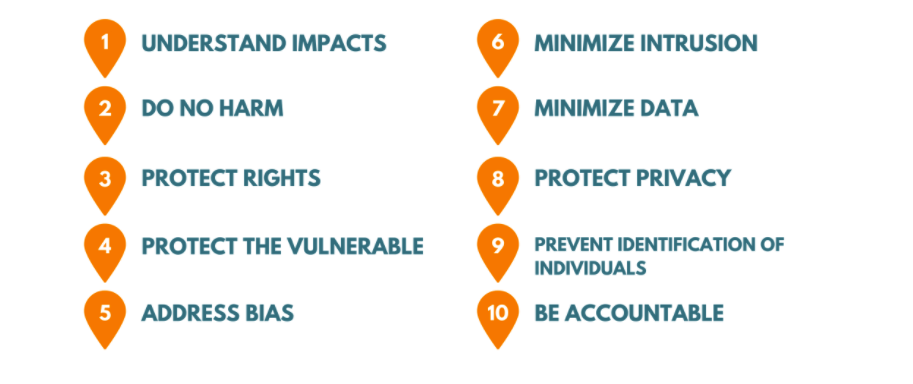Location data is widely used for all kinds of applications. Far beyond just mapmaking, it is embedded within everything from health trackers, targeted-advertising, traffic flow analysis, and social media algorithms. With estimates that 90% percent of apps containing third-party trackers also collect location data, citizens have been transformed into a far-reaching network of sensors that provide feedback to companies and organisations with varying degrees of public and commercial interests. While there can be many positive uses of location-data, as the recent example of contact-tracing COVID-19 cases has illustrated, there are also persistent concerns about both the intended and unintended consequences of such mass data collection.
The Locus Charter, launched on 24th March 2021, is a suggested set of ten principles for the ethical use of location data proposed by Benchmark and EthicalGEO. These organisations aim to offer a framework for the responsible use of location data by all parties who collect and utilize it. The charter itself notes the rising need for a common set of international principles in response to growing concerns among the public, the media, and professionals in the technology industry about the negative impacts of location-based data collection.

The Locus Charter Principles: https://benchmarkinitiative.com/charter
Cartographers have long grappled with numerous ethical issues related to the collection and representation of information. For those who have worked or researched in this field, the principles laid out in the Locus Charter will not be particularly surprising. They will appear familiar to readers of Cartography: Thematic Map Design, or anyone who has engaged with critical geographic scholarship, such as Denis Wood’s The Power of Maps.
However, map making and the use of location data is no longer exclusively the domain of cartographers. Millions of ‘maps’ are deployed via the web daily, along with the generation of 2.5 quintillion bytes of data, much of it with geographical information attached. Much of this activity is facilitated by tech companies such as Google or Facebook, but also by masses of smaller start-ups that increasingly link their valuation to the amount of data they hold. The interest of these companies in location data has little appreciation for critical cartography scholarship, and they rarely employ professional geographers to conduct such work. What these principles aim to do then, and where their value can be situated, is to attempt to bring critical examination to the commercial location data business and address the real, every-day issues related to privacy and the collection/control and use of data.
Owing to the potential of abuse of location data, this is a critical project, and the writers of the principles should be commended for bringing some of these long-standing ideas into the public domain, while also updating them to meet challenges posed by contemporary developments. The principles have also been launched at a time when questions related to the ethics of data are heightened. Much of this related to AI, which generates most of the attention owing to its novelty. Yet many of these debates are also implicitly concerned with geographical data. Therefore, as concerns about data ethics move into a more mainstream area of the debate, the simplicity of the Locus Charter will be wildly welcomed. And there is little to argue against in the ten clear principles that implore uses of location data to do no harm, protect the vulnerable, minimize intrusion, and uphold accountability. Of course, this generates a new concern: that the very simplicity of these principles may be problematic.
As Tom Koch cautions readers in Ethics in Everyday Places, those that are looking for an easy fix, a straightforward ethical rule or inflexible moral standard, will be setting themselves up for disappointment. In striving for a set of principles that stress simplicity, The Locus Charter has reduced highly complex ethical issues to a few sentences. While this is useful in gaining support, it leaves critical gaps.
Take, for example, the principle to minimize data (principle 7). This sounds like an excellent principle on the surface, and it is hard to argue with in many contexts. However, a number of complex issues arise. Firstly, there is the question of exactly who will decide what is minimal data, and how such decisions will be reached. It has already been seen that organisations such as Europe’s Border Agency, Frontex, employ a twisted version of this principle to avoid international obligations to rescue migrants in the Mediterranean. Similarly, the principle of minimising intrusion (principle 6) also makes sense, but does not answer questions about minimising intrusion through the collection of data via satellites for example. Such practices lead to issues of informed consent or dehumanised and sterile decision making, something that continues to plague many development projects that draw upon remote sensing.
The issue here is not that the principles are bad, wrong or unhelpful, but rather that they do not address the underlying biases that are the actual cause of many of the problems they are attempting to address – even though principle 5 calls for precisely this. Decisions concerning data collection, processing, and sharing are based not only on quantitative values about usage, but also on innate attitudes about how the world works. Untangling these preconceptions takes a great deal more work, and requires a larger shift towards unpacking issues of power.
Geography has a long history of ethical discussion and critique, but as location data and geographic information have become the object of rapid, self-indulgent expansion by the tech industry, it has followed their lead in seeking more technological fixes for its own problems. As those have been shown to consistently fail, the industry is increasingly turning to regulation, principles and guidelines. However, as it does so, the power to write, adopt and disseminate such principles remains in the hands of a few. The cornerstone of ethical practice is being transparent about risks to the population, and the Locus Charter does little to address this, rather keeping the power to decide what is good for individuals in the hands of corporations and organisations who profit from location data. As technology becomes more complex, it becomes harder to discern the way in which our data is used and companies are all too incentivized to share the benefits of sharing location data, without clearly explaining the risks. While companies are starting to appreciate people’s concerns around data use, commercial priorities are still winning out. And with the British government estimating that location data could add £11 billon to the UK’s digital economy each year, the Charter risks being little more than a sticking plaster, or being used for “ethics-washing” harmful data use. To reiterate, the claim here is not that the principles are unhelpful, but rather to suggest that to be an ethical framework they need to do more to ask questions about power and money.
The Locus Charter is an important and welcome step towards rectifying the way in which location data has become a free-for-all. It should be praised for its overall mission to create a universal and accessible set of principles for the use of individuals’ location data by technology companies. However, this same simplicity is what leads to the Locus Charter’s failure to address the ethical questions it aims to resolve. To become a truly robust framework the Locus Charter will need to engage in difficult conversations about power, money, control, and informed consent. The Charter, and its supporters, will need to engage with the communities affected, and challenge the status quo in which the ethical decision-making processes are left to the very companies that benefit most from abusing location data. I, for one, look forward this next stage in the life of the Locus Charter.
Feature image: Samuel Foster – Unsplash












